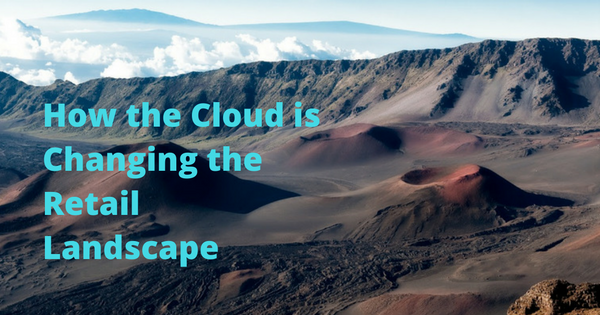You may not be aware how the cloud affects you as a retailer.
There is a vast quantity of data available to help retailers make informed business decisions. However, the majority of brands do not collect useful data, let alone understand how to make best use of that data.
There’s Even More Data in Your Future
The amount of data available to you may be vast, but it’s also rapidly increasing, and for that you can blame the Internet of Things (IoT). (The IoT is basically is the connection of one device to another – or a device to a human.)
According to Smart Data Collective and SAS:
- 12 million RFID tags were sold in 2011. These are the tags used to track movement of objects in the physical world. By 2021, it’s estimated there will be 209 billion RFID tags as more and more devices are connected to the Internet.
- The boom of IoT will lead to 50 billion devices being connected to the Internet in 2020, which is a steep increase from the 13 billion connected just 5 years prior.
As more and more things are being connected to the Internet and able to be tracked, the amount of data you can gather will increase. What you do with that data can change your retail business for the better.
How Can You Manage That Data?
This all sounds great, but how will you manage large amounts of data?
When it comes to data storate, you can choose to have either on-premise storage (backup drives, servers, etc.) or cloud-based storage (where all your data is housed offsite and accessed via the Internet).

With the influx of data headed our way, having cloud-based storage is a must for several reasons.
Timeliness
Servers are already set up and ready to store your company’s information. There’s no large up-front fees or hardware to buy; all you need to do is tap into what’s available.
Consolidation
Unless you’ve transitioned your business to the cloud, the data you have right now is fragmented. Inventory, reporting and shipping are all run on their own systems, which means each department’s information is stored – and analyzed – separately.
Scalability
As more information arrives in your business, outsourcing data to cloud providers means that you’ll be able to rapidly scale as needed.
Security
In the past, companies worried about giving their information to other servers to store. Not anymore.
“Because large clouds are geographically dispersed in data centers around the globe, they can pull in all kinds of security intelligence as data flows in and out of the cloud. This intelligence can then be used to track security threats and stop them far more quickly,” according to Information Week.
Economics
With the faster setup times, faster scalability, and bigger security, cloud computing saves (and has the potential to continue saving) your business a significant amount of money.
Data at Your Fingertips
Ok, so the cloud makes it easy to manage large amounts of data and store it in the same format. Now let’s take a look at the type of data analytics you’re working with.
As Tom Davenport of Deloitte argues, most of the time data crunching doesn’t go beyond descriptive (charts, graphs, etc). This is great for measuring historical variation, but not good at future prediction.
[Tweet “Are you using your retail data to describe the past or predict the future?”]
Davenport encourages companies to get the most value from the IoT by moving from descriptive to predictive (e.g., what combination of past purchases indicate a customer will be interested in your new product?) & prescriptive (recommendations, e.g., the best price to charge to maximize profit on a product).
The better you use the data you have available, the better you can make future predictions. And that means you can toss that dartboard out with your old servers. The cloud can help your chain predict customer behavior, ultimately enabling you to better market to and serve your buyers.
Start From Where You Are
If you haven’t started gathering much data yet, this may sound overwhelming.
It can be helpful to remember this is a stepwise process.
“A key with these multi-step models of analytics, however, is not to despair about how far you have to go, but simply to try to advance from where you are. … The sooner we start employing more sophisticated analytics, the sooner we can get some real value from the Internet of Things.”
~ Tom Davenport, Deloitte @tdav
In order to keep change manageable, we encourage our clients to start with a single project. Our systems provide descriptive, predictive, and prescriptive data, but most importantly, they are modular and allow additional data points to be added in the future.
Summary
The cloud provides retailers:
- The ability to store more data more efficiently
- A mechanism for data stored in departmental silos to be analyzed together
- The opportunity to analyze this ever-increasing amount of information, including across departments and across an entire chain
- The capacity to create predictions and recommendations based on this analysis
Retailers must continue to expand upon current systems for storing and managing data, and using data to drive decisions.
Alert Tech’s is proud of our practical, real-world experience in data collection, storage, and analysis. Questions? Contact us today, or download our retail analytics whitepaper below.
[xyz-ihs snippet=”TOFU-Retail-Analytics-IOT”]
